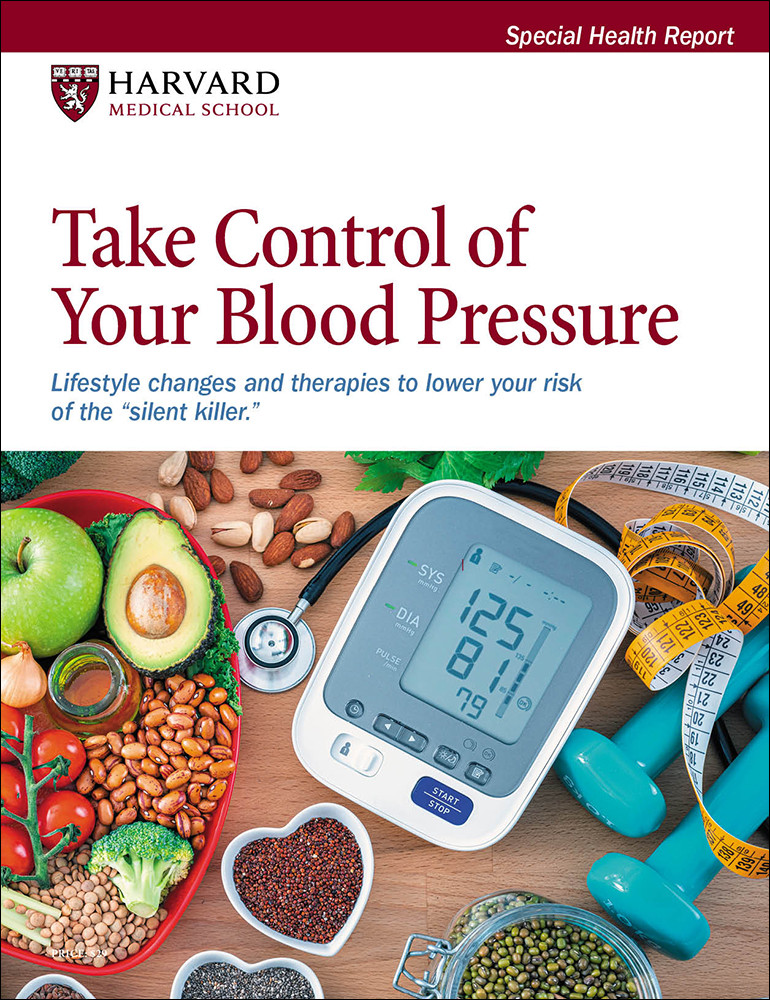When blood pressure falls after you stand up
Known as orthostatic hypotension, this condition becomes more common with age and frailty.
- Reviewed by Christopher P. Cannon, MD, Editor in Chief, Harvard Heart Letter; Editorial Advisory Board Member, Harvard Health Publishing

That odd sensation of feeling lightheaded or dizzy after standing up happens to most people at least once in a while. Caused by a temporary delay in blood flow to the brain, the feeling usually resolves within a few seconds. But in some people, blood pressure plummets and stays low for a minute or longer after they stand up from a seated position. The problem, known as orthostatic hypotension (hypotension means low blood pressure) can cause people to fall, possibly leading to injury and disability.
However, most people with orthostatic hypotension don't have any symptoms. Another complication: it affects about one in 10 people with high blood pressure, which is very common in older adults. In fact, nearly 75% of people ages 60 and older have blood pressure readings of 130/80 mm Hg or higher (the definition of high blood pressure). An optimal blood pressure levels is lower than 120/80 mm Hg.
"Current guidelines for treating high blood pressure encourage doctors to screen people for orthostatic hypotension," says Dr. Alyson Kelley-Hedgepeth, a cardiologist at Harvard-affiliated Brigham and Women's Hospital. It's defined as a decrease in systolic pressure (the first number of a blood pressure reading) of at least 20 points or a decrease in diastolic pressure (the second number) of at least 10 points when measured within three minutes after standing up from a seated position.
What causes orthostatic hypotension?
When you stand, gravity pulls blood downward, away from your brain and heart. Special receptors in your neck and above your heart activate nerve and hormonal signals that tell your heart to beat stronger and faster while narrowing your blood vessels. This temporarily raises blood pressure and restores normal blood flow to the brain and heart. But with age, those monitoring receptors can become less responsive and don't immediately notice the drop in blood pressure.
When treating people with high blood pressure, doctors sometimes worry that intensive treatment (that is, taking medications that drive blood pressure down below 120/80) may worsen orthostatic hypotension. However, a 2020 study in Annals of Internal Medicine found that intensive blood pressure treatment actually lowered a person's risk of orthostatic hypotension.
Still, some blood pressure drugs (and certain other medications) can contribute to orthostatic hypotension, says Dr. Kelley-Hedgepeth. "If I find a person has orthostatic hypotension, the first thing I do is review their medications," she says. Diuretics, which flush extra fluid from the body, are a common culprit. Drugs that lower blood pressure by relaxing the blood vessels, such as beta blockers and calcium-channel blockers, can also be problematic. Because there are so many different blood pressure drugs, just changing from one class of drugs to another can help.
Aside from blood pressure drugs, other potentially problematic medications include those used to treat
- an enlarged prostate, such as alfuzosin (Uroxatral) and tamsulosin (Flomax)
- erectile dysfunction, such as sildenafil (Viagra)
- depression, such as paroxetine (Paxil) and amitriptyline (Elavil).
For people on these drugs, it's worth trying a different medication to see if it makes a difference. But the change won't happen overnight, and it may take a few months to find out, says Dr. Kelley-Hedgepeth.
Finally, several diseases, including diabetes and Parkinson's disease, can damage the nerves involved in blood pressure control, leading to orthostatic hypotension.
Coping with orthostatic hypotension
If you have symptoms of orthostatic hypotension, these strategies may help:
- Don't forget fluids. Drink water throughout the day; don't wait until you're thirsty. But avoid alcohol, which can cause you to become dehydrated.
- Avoid big meals. A related condition, called postprandial hypotension, can cause blood pressure to drop after eating; it's also mostly seen in older people. It happens because of the increased blood flow to the intestines needed for digestion, which leads to reduced blood flow to other parts of the body.
- Support your legs. Compression stockings that squeeze the legs may help. Thigh-high or waist-high versions are much more effective than knee-high stockings.
- Take care when rising. Getting out of bed is a common trigger, so pump your legs up and down a few times while still sitting on the edge of your bed to get your blood flowing before you stand up.
Image: © supersizer/Getty Images
About the Author

Julie Corliss, Executive Editor, Harvard Heart Letter
About the Reviewer

Christopher P. Cannon, MD, Editor in Chief, Harvard Heart Letter; Editorial Advisory Board Member, Harvard Health Publishing
Disclaimer:
As a service to our readers, Harvard Health Publishing provides access to our library of archived content. Please note the date of last review or update on all articles.
No content on this site, regardless of date, should ever be used as a substitute for direct medical advice from your doctor or other qualified clinician.













